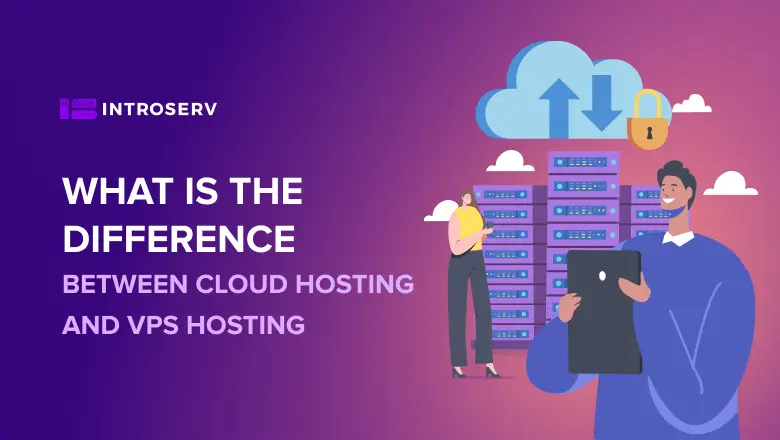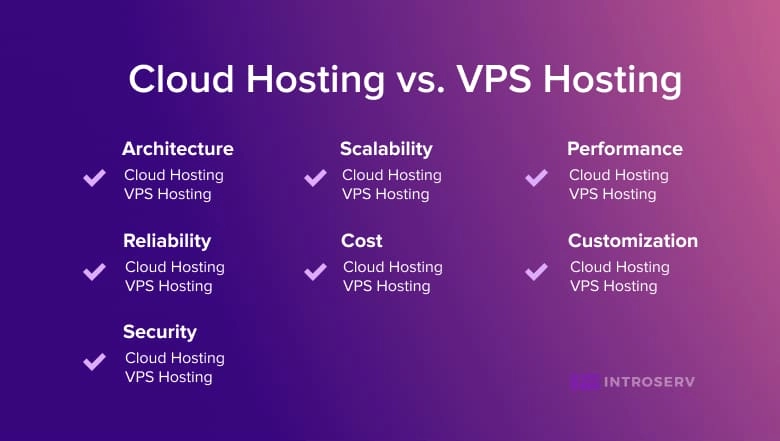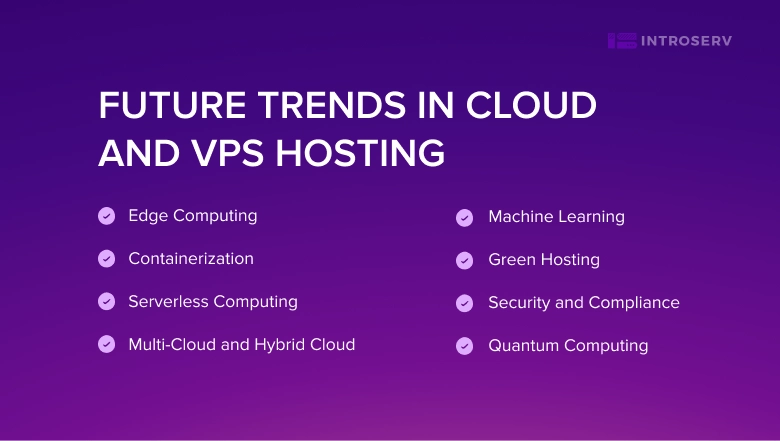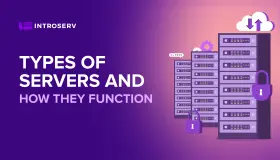
What is the Difference Between Cloud Hosting and VPS Hosting
Are you a website owner who's been managing your online presence through traditional hosting solutions like shared hosting or dedicated servers?
Then it's important to understand the differences between VPS Hosting and Cloud Hosting if you're looking to elevate your hosting game and maximize the potential of your website.
First Let's get an idea about the hosting.
Hosting refers to the process of providing the necessary infrastructure/services to make content accessible over the Internet.
You need a place to store its files and data so that users can access it anytime from anywhere when you create a website or develop an online application. This is where hosting comes into play.
Web hosting typically involves renting space on a server owned by a hosting provider. The type of hosting you choose depends on factors such as the size & complexity of your application, the level of control and customization you require, your budget, and your performance needs.
Different types of hosting include shared hosting, virtual private server (VPS) hosting, dedicated server hosting, cloud hosting, and more. Each type has its advantages and limitations. In this article, we will see what is the difference between Cloud Hosting and VPS Hosting.
Let's get started!
What is Cloud Hosting?
Cloud hosting is a type of web hosting service that makes use of multiple servers to distribute resources & balance the load.
Your website is normally hosted on a single physical server when using traditional web hosting.
But in cloud hosting, your website data is spread across a network of interconnected virtual/physical servers.
How Cloud Hosting Works?
Cloud hosting operates on the principle of resource pooling where computing resources such as processing power, storage, connectivity, and bandwidth are drawn from a network of interconnected servers.
When a user requests access to a particular application hosted in the cloud, the request is routed to the nearest server which results in a fast response.
Virtualization is a fundamental technology that supports cloud hosting by allowing the setup of virtual servers/instances within the cloud environment. Users can deploy & operate their apps separately while sharing the underlying physical resources with these virtual instances.
Cloud hosting companies distribute workloads effectively and allocate resources according to demand using automatic scaling methods and complex load-balancing algorithms.
Features and Benefits

- Scalability
Easily scale resources up or down based on demand.
- Ease of Management
Simplified management through centralized control panels.
- Flexibility
Customizable configurations to suit specific requirements.
- Cost-Efficiency
Pay-as-you-go pricing eliminates upfront investment in hardware.
- High Performance
Optimal performance even under heavy loads.
- Global Accessibility
Accessible from anywhere with internet connectivity. Automatic Backups & support for Various Workloads like applications, and data storage.
Use Cases
Some common use cases for cloud hosting include:
- Big Data Analytics
Organizations use cloud hosting to analyze large volumes of data for business intelligence & analytics purposes.
- Content Delivery Networks
CDNs decrease latency and increase website performance by caching data on servers that are closer to end users.
- Development and Testing Environments
Cloud hosting offers on-demand resources for development/testing purposes that allow developers to quickly test & run in virtual environments without the need for dedicated hardware.
- Software as a Service (SaaS)
SaaS providers use cloud hosting to deliver their software applications to customers over the Internet and give automatic updates without the need for users to manage infrastructure.
- Media Streaming and Video Hosting
Streaming services use cloud hosting to deliver multimedia content to users across various devices that provide the necessary bandwidth to support high-definition streaming and large audiences.
- Disaster Recovery and Backup
Businesses can replicate their data and applications to multiple cloud servers located in different geographic regions.
- Internet of Things
IoT applications rely on cloud hosting to collect, store, and analyze data from connected devices. Cloud platforms provide data processing capabilities to handle the large amounts of data generated by IoT devices.
What is VPS Hosting?
VPS stands for Virtual Private Server. It's a type of hosting where a physical server is virtually divided into multiple virtual servers.
Each virtual server operates independently with its operating system & dedicated environment.
Users have root access to their virtual server that allows them to install and configure the software as if they had their physical server.
How does it work?
VPS relies on virtualization software such as hypervisors like VMware or KVM. These software layers create virtual instances or containers within a single physical server.
Each virtual instance operates independently on the same physical server. This isolation makes sure that an issue with one VPS does not affect the performance of others.
The physical server resources including CPU, RAM, storage, and bandwidth are divided among the virtual servers. Each VPS is allocated a dedicated portion of these resources which can be customized based on the user's requirements.
Each VPS runs its OS which allows users to configure software & perform administrative tasks as needed.
Common operating systems used in VPS hosting include Linux distributions (such as Ubuntu, and CentOS) and Windows Server.
Users generally have root access to their VPS which grants them full control over their hosting environment. It enables users to install/customize software & configure server settings according to their specific needs.
Features
- Customization
Users have full control over their VPS environment including the ability to install custom software and configure server settings according to their specific requirements.
- Reliability
VPS hosting is more reliable than shared hosting due to the independent operation of each virtual server. Issues with other user websites/applications do not impact the performance or stability of your VPS.
- Performance
VPS hosting generally provides better performance than shared hosting since resources are dedicated to each virtual server. This results in faster loading times, and better response times for applications.
- Cost-effectiveness
It is more cost-effective than dedicated hosting since users can enjoy the benefits of dedicated resources at a fraction of the cost.
Optimal Use Cases for VPS Hosting
- Growing Websites
VPS hosting is useful for websites that need more resources than shared hosting can provide but do not require the dedicated resources of a dedicated server. It allows them to scale resources as needed without experiencing downtime or performance issues.
- E-commerce
E-commerce websites often require higher levels of security & performance than shared hosting can provide.
- Development/Testing Environments
Developers often use VPS hosting to create isolated development & testing environments where they can experiment with different configurations and deploy updates without affecting production environments.
- Resource-intensive Applications
Applications that require significant CPU/storage resources such as content management systems (CMS), databases, and multimedia streaming platforms can benefit from the dedicated resources offered by VPS hosting.
Cloud Hosting vs. VPS Hosting

Architecture
- Cloud Hosting: Cloud hosting operates on a distributed architecture that uses multiple servers interconnected to act as a single entity. It offers scalability by allowing resources to be added or removed on-demand.
- VPS Hosting: VPS hosting involves partitioning a physical server into multiple virtual servers. Every server functions independently with its OS and resources.
Scalability
- Cloud Hosting: Highly scalable as resources can be scaled up or down instantly based on demand. Users generally pay for the resources they consume.
- VPS Hosting: Scalability is limited to the resources allocated to the VPS. Upgrading resources usually involves manual intervention & potential downtime.
Performance
- Cloud Hosting: Performance can be variable due to shared resources and the nature of distributed computing. However, Many cloud providers offer high-performance options with guaranteed resources.
- VPS Hosting: It Generally offers consistent performance since resources are dedicated to each VPS. Performance can be affected if neighboring VPS on the same physical server consume excessive resources.
Reliability
- Cloud Hosting: Cloud hosting tends to be more reliable due to its distributed nature. If one server fails, the workload is automatically shifted to other servers in the network which reduces downtime.
- VPS Hosting: Reliability depends on the quality of the hardware & infrastructure of the hosting provider. A failure in the physical server hosting the VPS can lead to downtime [5].
Cost
- Cloud Hosting: Cloud hosting follows a pay-as-you-go model where users pay for the resources they consume. It can be cost-effective for variable workloads.
- VPS Hosting: VPS hosting usually involves fixed pricing based on the allocated resources. It may be more cost-effective for predictable workloads with steady resource requirements.
Customization
- Cloud Hosting: Offers less control & customization compared to VPS hosting. Users typically interact with the cloud through a management interface or API.
- VPS Hosting: Provides more control as users have full root access to their virtual server allowing them to install/configure software as needed.
Security
- Cloud Hosting: Security measures are typically implemented at various levels of the cloud infrastructure but the shared nature of resources can pose security risks.
- VPS Hosting: Security depends on the user's configuration & maintenance practices. Since each VPS operates independently, it's less susceptible to security issues affecting neighboring servers.
Choosing the Right Hosting for Your Needs
There are several factors to consider while choosing the Hosting service. Some of them are:
Scalability
Cloud hosting generally offers greater scalability than VPS. You can easily scale resources up or down based on your needs in real time with cloud hosting. VPS scalability is limited by the resources allocated to your virtual server.
Resource Allocation
VPS hosting might deliver more consistent results than shared hosting when it comes to performance because it allocates dedicated resources to the virtual server. On the other hand, cloud hosting allows for dynamic allocation of resources that ensures optimal performance even during traffic spikes.
Cost
VPS hosting tends to have a more predictable pricing structure since you're paying for a fixed amount of resources. Cloud hosting operates on a pay-as-you-go model where you're billed based on actual resource usage. One option may be more cost-effective than the other depending on your usage patterns.
Reliability and Uptime
Both cloud hosting and VPS can offer high levels of uptime if configured properly. Cloud hosting often utilizes redundancy across multiple servers and data centers that provide greater resilience against hardware failures.
Control and Customization
VPS hosting gives you more control over server configurations & allows for greater customization compared to cloud hosting. VPS might be the better option if you require specific software installations or configurations.
Security
Both cloud hosting and VPS can be secured effectively with proper measures in place. Security responsibilities typically fall more on the user in VPS hosting as you have greater control over server configurations. Cloud hosting providers offer built-in security features and may handle some aspects of security for you.
Technical Expertise
Managing a VPS requires more technical expertise compared to cloud hosting - as you're responsible for server administration tasks such as software updates & security patches. Cloud hosting, especially managed cloud services can abstract away much of the complexity which makes it more accessible to users with limited technical knowledge.
Future Trends in Cloud and VPS Hosting
Here are several trends that could shape the future of cloud and VPS hosting.

Edge Computing
There will be a greater need to process data closer to the source to reduce latency & improve performance as IoT devices are increasing. Edge computing involves processing data near the edge of the network where it is generated will become more prevalent. These Hosting providers may offer edge computing services to meet this demand.
Containerization
Containers offer lightweight and portable environments for deploying applications. Kubernetes (open-source container orchestration platform) has gained widespread adoption for managing containerized applications. Cloud and VPS hosting providers will likely offer managed Kubernetes services and support for containerized workloads.
Serverless Computing
It abstracts away infrastructure management that allows developers to focus mainly on writing code. This trend is likely to continue with more cloud providers offering serverless platforms. VPS hosting may also adopt serverless architectures to provide more flexibility to customers.
Multi-Cloud and Hybrid Cloud
Organizations are increasingly adopting multi-cloud and hybrid cloud strategies to use the strengths of different cloud providers and on-premises infrastructure. Hosting providers may provide tools to promote workload migration & integration across multiple environments.
Machine Learning
AI & machine learning technologies are being integrated into cloud services to improve performance & automation. AI-driven features such as predictive scaling and automated resource optimization can be configured.
Green Hosting
There will be a greater focus on sustainability in data centers as environmental concerns become more prominent. It will be a good option for hosting companies to invest in renewable energy sources and carbon offset programs to reduce their environmental impact.
Security and Compliance
Security will remain a top priority for cloud/VPS hosting providers with the growing number of cyber threats and regulatory requirements. Future trends may include improved security features such as encryption and identity & access management.
Quantum Computing
Quantum computing has the potential to revolutionize computing power & solve complex problems more efficiently in the early stage. Hosting providers may explore these computing services to offer quantum-powered solutions to their customers.
Conclusion
Ultimately, the best option depends on your specific needs.
Cloud hosting might be a better option if scalability & flexibility are needed. VPS hosting can be the best option if control and affordability are your top priorities.
I hope you found this article helpful in learning about cloud hosting and VPS hosting and the difference between them.
You may also be interested in learning about the hosting to choose the best option for you.








